Since the technology industry and associated media outlets tend to focus primarily on the latest and greatest technology and what’s right around the corner, it sometimes seems as if the only valid option when you need a new laptop, phone, desktop, or whatever is to spend top euro on the newest, most expensive incarnations of those. But what if you need, say, a new laptop, but you’re not swimming in excess disposable income? Or you just don’t want to spend 1000-2000 euro on a new laptop?
The tech media tends to have an answer for this: buy something like a cheap Chromebook or an e-waste €350 Windows laptop and call it a day – you don’t deserve a nice experience. However, there’s a far better option than spending money on a shackled Chromebook or an underpowered bottom-of-the-barrel Windows laptop: buy used. Recently, I decided to buy a used laptop, and I set it up how I would set up any new laptop, to get an idea of what’s out there. Here’s how it went.
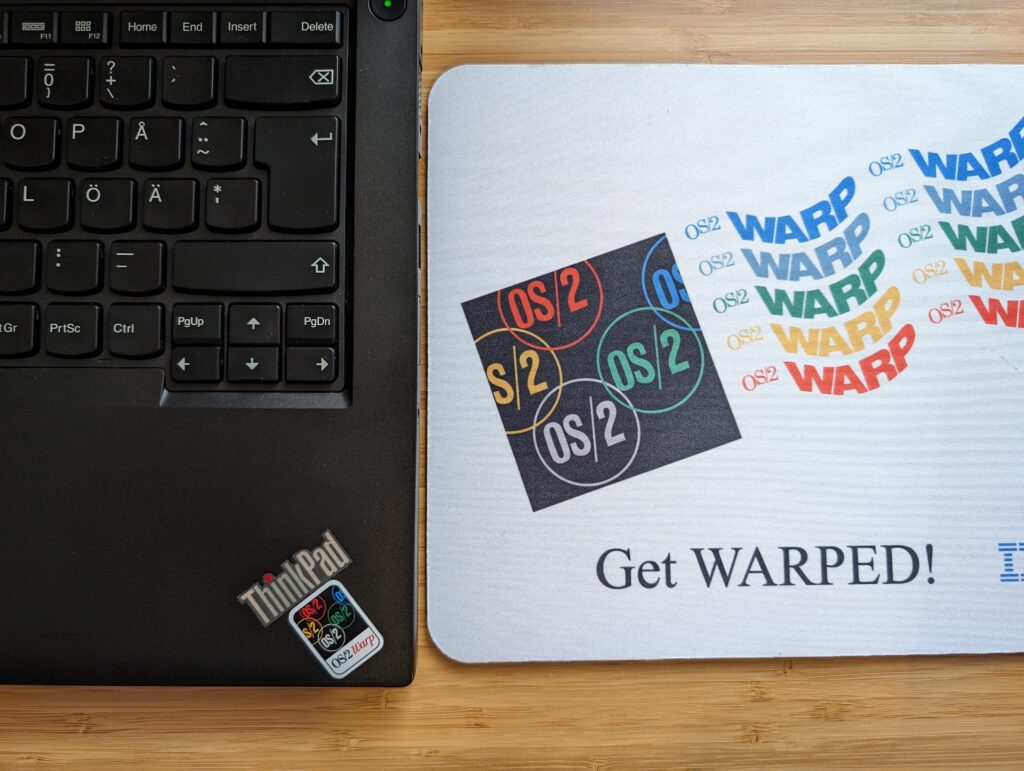
For this little experiment, I first had to settle on a brand, and to be brutally honest, that was an easy choice. ThinkPads seems to be universally regarded as excellent choices for a used laptop for a variety of reasons which I’ll get to later. After weighing some of the various models, options, and my budget, I decided to go for a Lenovo ThinkPad T450s for about €150, and about a week later, the device arrived at my local supermarket for pickup.
Before I settled on this specific ThinkPad, I had a few demands and requirements. First and foremost, since I don’t like large laptops, I didn’t want anything bigger than roughly 14″, and since I’m a bit of a pixel count snob, 1920×1080 was non-negotiable. Since I already have a Dell XPS 13 with an 8th Gen Core i7, I figured going 3-4 generations older seemed like it would give me at least somewhat of a generational performance difference. An SSD was obviously a must, and as long as there were expansion options, RAM did not matter to me.
The T450s delivered on all of these. It’s got the 1920×1080 14″ IPS panel (there’s also a lower resolution panel, so be sure to check you’re getting the right one), a Core i5-5300U with 2 cores and 4 threads with a base frequency of 2.30GHz and a maximum boost frequency of 2.90GHz, Intel HD 5500 graphics, a 128GB SATA SSD, and 4GB of RAM. Since 4GB is a bit on the low side for me, I ordered an additional 8GB SO-DIMM right away for €35. This brought the total price for this machine to €185, which I considered acceptable. For that price, it also came with its Windows license, for whatever that’s worth.
I don’t want to turn this into a detailed review of a laptop from 2015, but let’s go over what it’s like to use this machine today. The display cover is made of carbon-reinforced plastic, and the rest of magnesium. You can clearly feel this laptop is of a slightly older vintage, as it feels a bit more dinkey than I’m used to from my XPS 13 9370 and my tiny Chuwi MiniBook X (2023). It doesn’t feel crappy or cheap or anything – just not as solid as you might expect from a modern machine.
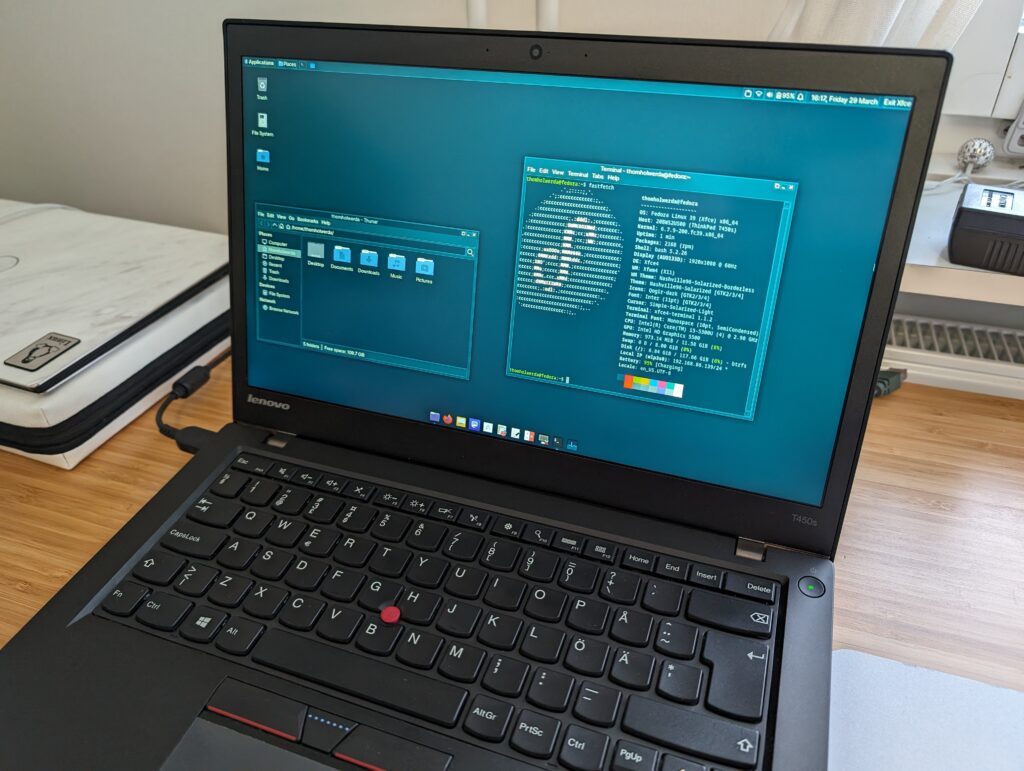
It’s got a whole load of ports to work with, though, which is refreshing compared to the trend of today. On the left side, there’s a smartcard slot, USB 3.0, mini DisplayPort, another USB 3.0, and the power connector. On the right side, there’s a headphone jack, an SD card slot, another USB 3.0 port, an Ethernet jack, and a VGA port. On the bottom of the laptop is a docking port to plug it into various docking stations with additional ports and connectors. On the inside, there’s a free M.2 slot (a small 2242 one).
First, I eradicated Windows from the SSD because while I’m okay with an outdated laptop, I’m not okay with an outdated operating system (subscribe to our Patreon to ensure more of these top-quality jokes). After messing around with various operating systems and distributions for a while, I got back to business and installed my distribution of choice, Fedora, but I did opt for the Xfce version instead of my usual KDE one just for variety’s sake.
ThinkPads tend to be well-supported by Linux, and the T450s is no exception. Everything I could test – save for the smartcard reader, since I don’t have a smartcard to test it with – works out of the box, and nothing required any manual configuration or tweaking to work properly. Everything from trackpad gestures to the little ThinkLight on the lid worked perfectly, without having to deal with hunting for drivers and that sort of nonsense Windows users have to deal with. This is normal for most laptops and Linux now, but it’s nice to see it applies to this model as well.
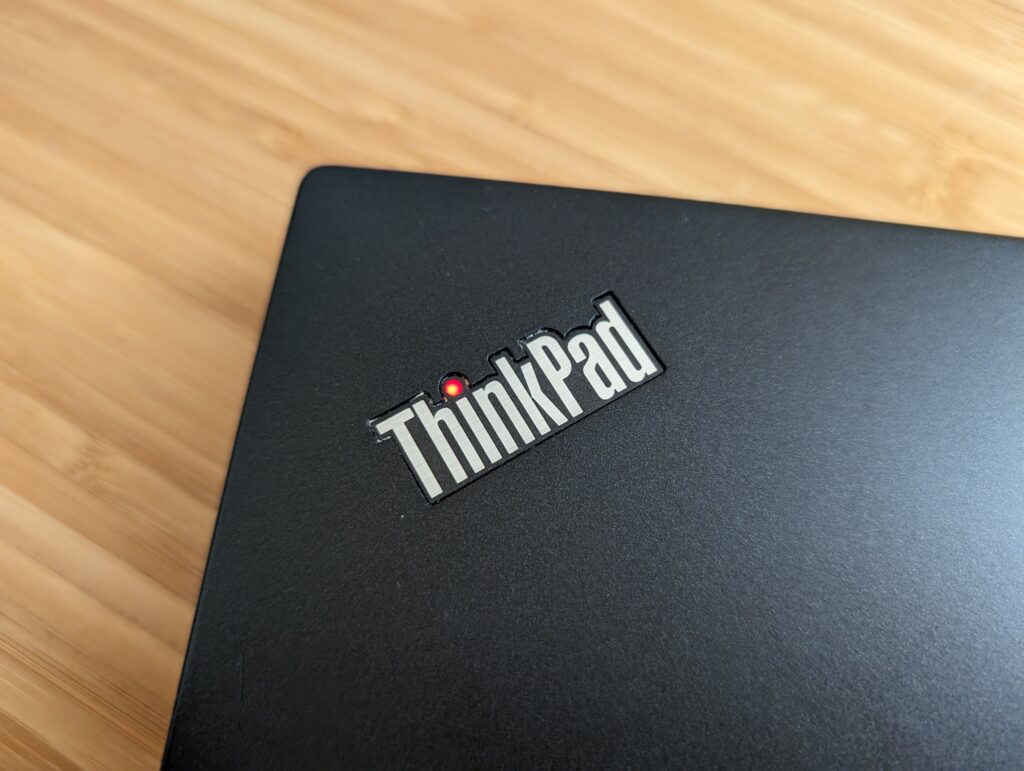
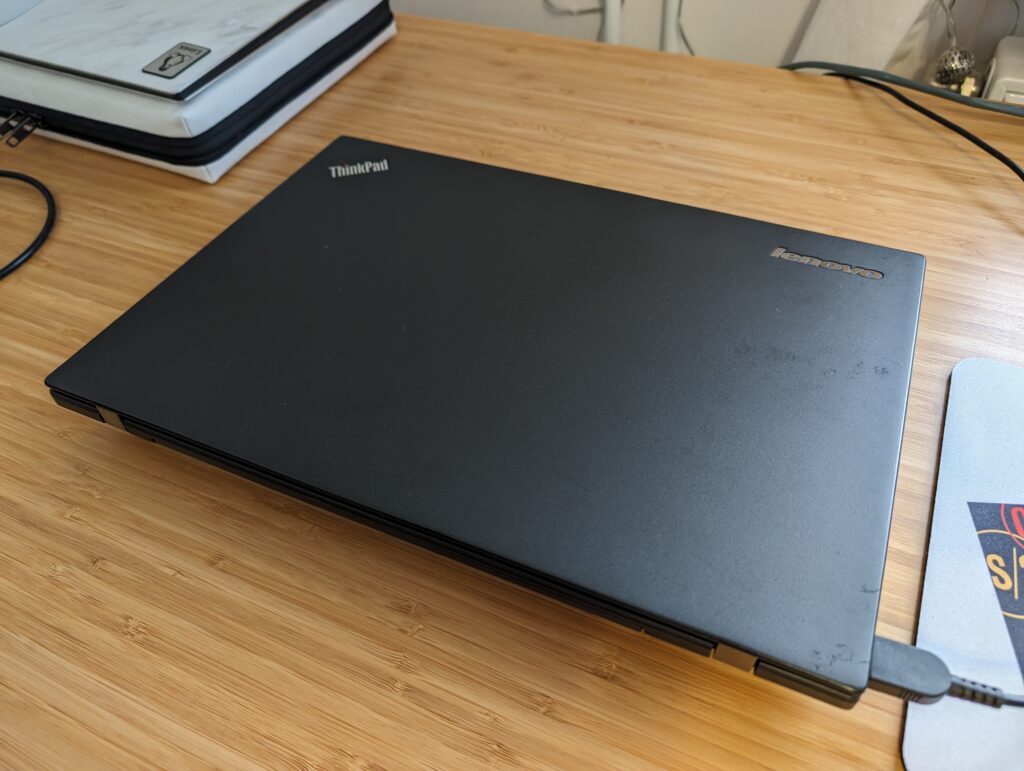
Using the T450s was… Uneventful. Applications open fast, there’s no stutter or lag, and despite having just 2 cores and 4 threads, and a very outdated integrated GPU, I didn’t really feel like I was missing out when browsing, doing some writing and translating (before I quit and made OSNews my sole job), watching video, those sorts of tasks. This isn’t a powerhouse laptop for video editing, gaming, or compiling code or whatever, but for everything else, it works great.
After I had set everything up the way I like, software-wise, I did do some work to make the machine a bit more pleasant to use. First and foremost, as with any laptop or PC that’s a little older, I removed the heatsink assembly, cleaned off the crusty old thermal paste, and added some new, fresh paste. I then dove into the fan management, and installed zcfan, a Linux fan control daemon for ThinkPads, using its default settings, and created a systemd service to have it start automatically. Additionally, I checked which codecs the Intel HD 5500 supports, as well as what Firefox reported as working, and then used enhanced-h264ify to disable VP9 on YouTube, since the HD 5500 cannot hardware-accelerate decoding VP9.
The end result is a fan that pretty much never turns on. Which is the only fan I like.
Expand and repair
As happy as I am with the ThinkPad, though, it has some serious flaws stemming from it being a used laptop. The included battery holds very little charge, there’s a red splotch on the display, and the keyboard uses the Swedish layout instead of the US (International) we use in The Netherlands, and it’s also not backlit, which is a big problem if you live in the Arctic and it’s dark during daytime. Luckily, here we run into the true reason why I feel ThinkPads are the best option for used laptops: parts availability for ThinkPads is exceptional.
Let’s fix the flaws, shall we?
The T450s has an interesting battery configuration: there’s space for an internal battery, as well as a ‘junk in the trunk’-style external one. Replacements for these in various capacities are readily available in countless stores, with the small internal battery going for roughly €40, while the larger external batteries run anywhere from €60 to €8O. You can get some serious battery capacity this way, especially if you go nuts and buy two or even more external batteries. Lenovo claims you can reach 20.7 hours of battery life if you combine the internal battery with the largest external one, for whatever that means in reality.
On my model, the interior battery compartment is partially taken up by a smartcard reader, so in order to insert an internal battery, I’ll need to remove that and find some sort of way to cover up the smartcard slot. The external battery replacement is obviously a lot easier, as it slots right in without having to open the device up. Imagine that.
Another fun fact is that you can also install a second M.2 SSD using the connector freed-up by removing the smartcard reader, if you so desire. Note, however, that this requires an adapter board (FRU 04X3827) and ribbon cable (FRU 04X3987), which will set you back about €20 each, depending on where you buy them from. If storage space is more important to you than battery capacity, this might be a great choice for you.
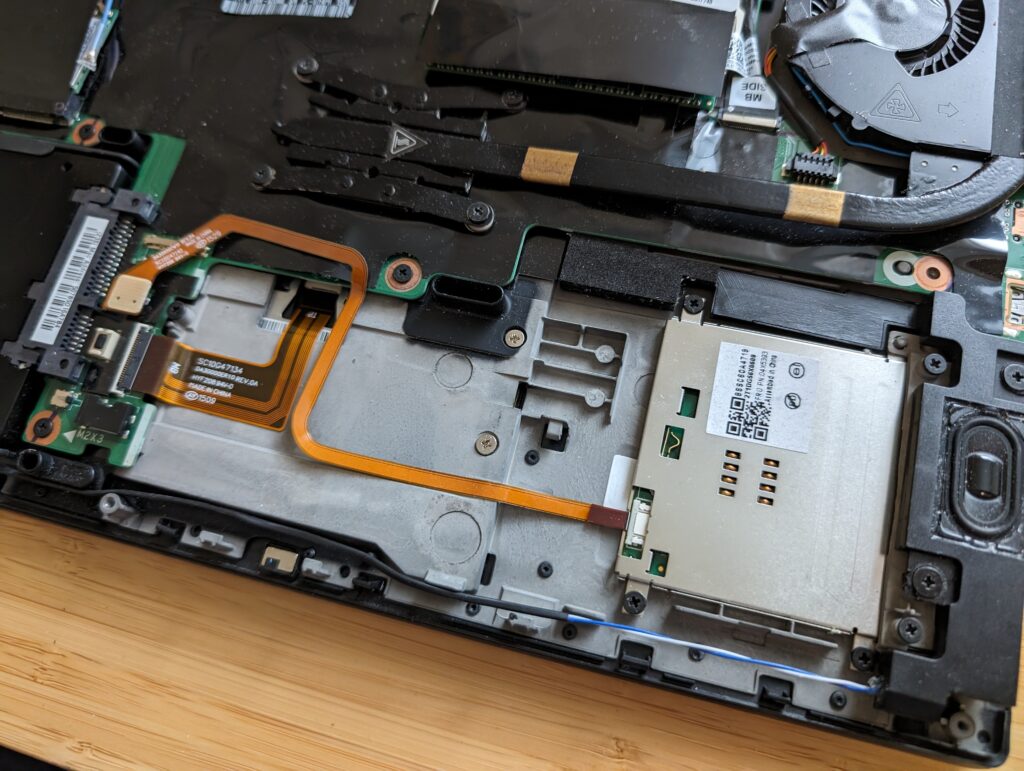
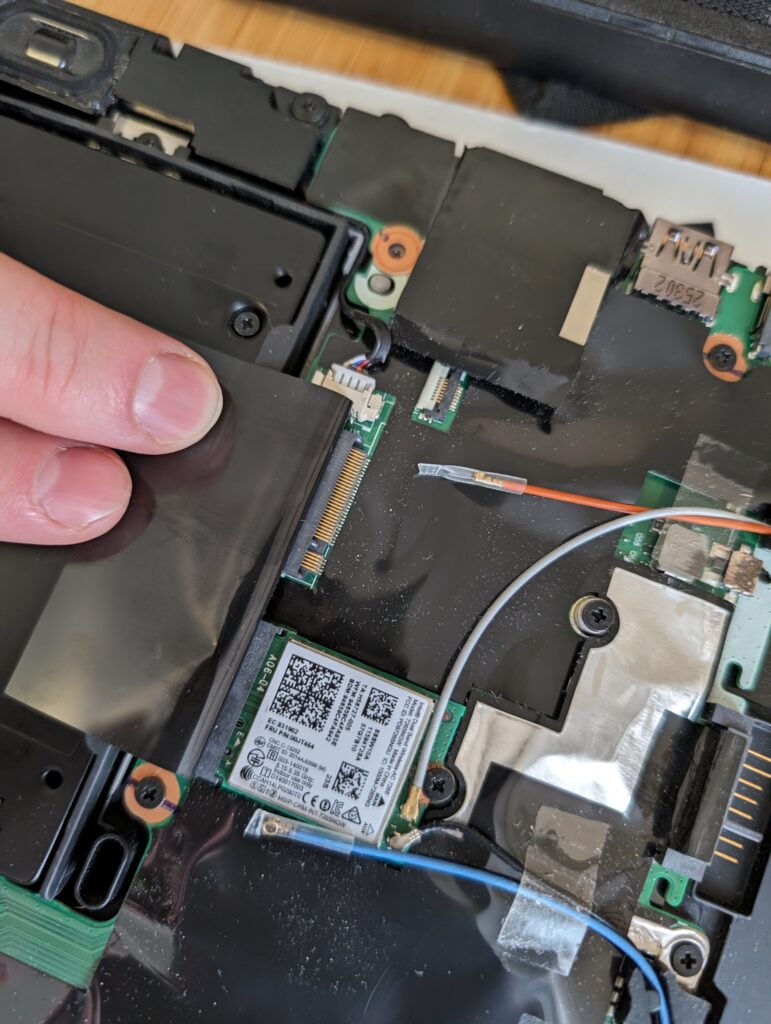
Replacing the keyboard is also possible, and not exactly difficult either. As long as you get the right keyboard for the T450s, you can opt for any keyboard layout you want. In addition, if your model lacks the backlit keyboard – like mine – you can choose to buy a backlit keyboard instead. A new keyboard will set you back no more than €40 or so, and they’re widely available.
Lastly, I can also replace the display, and it seems this is a fairly easy affair. The reddish splotch on my display is only really visible when it’s on a very dark section of the screen, but it bothers me just enough that I want to fix it. A new 1080p display for the T450s costs about €60 or so, making it kind of a no-brainer if you’re experiencing display issues like I am.
I have not yet decided on which of these upgrades and fixes I’m going to be performing. Even if I purchase the two batteries, a new keyboard, and a new display to bring this laptop back to an almost pristine state, I’ll have only spent an additional €180 or so, which isn’t a lot considering what you’ll be getting for it: a ton of battery life, a keyboard with backlighting and the right layout, and a display without a red splotch on it. Let me know in the comments if you’d be interested in an article detailing these upgrades, and if there’s enough interest, I’ll order the parts and detail the work I needed to do to perform the repairs and upgrades.
However, even without any of these upgrades and fixes, this T450s is an excellent laptop for an amazing price, and can serve the needs of casual and more serious users alike. It’s a great buy for any kids going off to high school or university, and even as a primary laptop for a more demanding user, it’ll do just great. You really don’t have to spend well over a thousand euros or dollars to get a capable, fast laptop – and the ThinkPad’s wide availability of upgrades and replacement parts means you’ll get even more value for your money than just the ‘base’ laptop itself.
By buying used, you’re not only preventing a laptop from becoming dangerous toxic e-waste for people in poor countries to get sick from, but you’re also saving a load of money you can spend on more important things. Especially if you’re a family with multiple kids going to school and a normal, average income, used laptops like this ThinkPad are a great value, further enhanced by excellent repairability and parts availability so that you can keep the machine afloat for many years to come.

Props to you, Thom! I’m glad you are speaking up for going used! Buying used is often stigmatized even though it makes a lot of sense and more of us should be doing it. Many people won’t even consider used, but your money will go a lot further and you can set your sights on high quality upgradable products that cost less than cheaply made disposable junk that won’t last as long. And as you pointed out many new products follow the apple trend of removing ports that are still useful. Extending product lifetime is a great bonus too.
I too own a T450s 🙂
And a X250, and a W550s, and a…
..oh boy…
I wouldn’t recommend buying a T450s these days anymore.
Prices for spare-parts and batteries are picking up, and prices for the 5 years newer T14 series are in free fall.
@Thom:
The LTE-modem for your Thinkpad (Sierra EM7345 with FRU-number) should cost you around 10€.
IMHO a worthwhile upgrade if you use it while traveling/commuting.
I still use my T410 with an SSD for Haiku as it is fully supported and it’s very fast with this OS. Battery is dead but there is always something.
Great! ThinkPads are excellent machines. I’ve been using used ThinkPads for years now.
Two things:
First – there is no backlit keyboard, but there is “think light”. A little led on the top part of the screen that shines a light on the keyboard. A very cost-effective way of solving the polar night problem!
Second – I’ve recently discovered a line of used laptops that are almost better than thinkpads: MacBooks! For €150 one can get a 10 year old intel macbook (air) that can easily run Linux. Not as serviceable as a thinkpad. But a lot sleeker. (And all models come with backlit keyboard.)
Cheers.
“First – there is no backlit keyboard, but there is “think light”. A little led on the top part of the screen that shines a light on the keyboard. A very cost-effective way of solving the polar night problem!”
No, the __50 series has a backlit keyboard and no thinklight anymore.
I believe lenovo made the switch with the __40 series.
> to the little ThinkLight on the lid worked perfectly
Pretty sure that the t450s doesn’t come with a thinklight. A thinklight is a white led in the lid to illuminate the keyboard. Not to be confused with the red led on the outside of the lid, located in the i’s dot.
Recently bought a T480 to replace my tired Macbook Air 11″. As much as i like the Apple software, the Thinkpad hardware is leagues better. It has it’s flaws, yes (mostly thermal design/placement of heatsinks and radiators) but the repairability, expandability and performance (even with the lowest i5 in the range) run circles round my old Macbook.
I’ll never buy a Macbook again.
After you listed those extras, I am not so sure this is that good of a deal. In the netherlands, at least, you’d be within throwing distance of a properly fitted refurb t480 for that price, which would have the added perk of a quad core cpu.
Downside would have been that you’d have had no excuse to tinker with it, though.
I agree that ThinkPads make great (used) computers. Before I sold my P50 I had a lot of good use out of it (especially after putting in some extra RAM). But that was a 6th gen i7, introduced in 2015 and since then the CPU’s have made a nice big leap in processing power. But still, if you don’t use that power… Those ThinkPads seem to last forever.
I still use my X270, best portable I have ever owned. The X270 was the last with the ability to actually upgrade the RAM (without major surgery) and to have dual batteries. When new I could get almost 20 hours out of them. The X280 went to soldered RAM and single internal battery.
I opted for the i5-7300u. The i7 was only marginally faster, and more cache, but would throttle more than the i5 due to heat in the small chassis. 12.5” 1920×1080 IPS, Backlit keyboard, fingerprint reader, smartcard reader, I swapped the original 8GB for 32GB of RAM (single SO-DIMM), AX-210 WLAN (last model I could get that was PCIe/USB), EM7455 LTE WWAN (bought used), and added a 1TB NVMe. Still more fun side projects that can be done with it. 🙂
I had an X200 Tablet (bought used) before it that had most of the guts replaced. I end up starting on a path of turning them into a Ship of Theseus. The older Thinkpads may not be the best looking or best performing but they are built like tanks and easily serviceable. I have a newer HP Omen 15 as well, but it just does not compare to the utility and build of a Thinkpad.
ThinkPads are pretty cool. I really like the sleek professional look. But it’s hard finding reliable channels to buy them from. I wish it wasn’t this way.
For a few years now I’ve been purchasing refurbished business laptops from Dell Refurbished. As the name suggests, they are Dell computers and if you get the Grade A ones, they are in close to perfect condition. I only get the 7000 series, as they are more high-end. I have a Dell Latitude 5420 from work and just a few months ago purchased a Latitude 7420 for $400 from these guys and there’s definitely a difference in build quality. I don’t know if they ship to Europe, but they do free shipping on most things and regularly have 50% off coupons.
Having done a few upgrades on ThinkPads from the T- series myself I recommend Subtel batteries and replacing the thermal paste on the CPU/GPU. The stock TIM isn’t bad, but after ~9 years even the best pastes need replacement.
Great article, Thom.
I’ve ordered so many ThinkPads at work. They’ve been my go-to for decades now.
I think the ThinkPad T480s is the pinnacle of ThinkPad design so far. Stellar keyboard, great 1080p IPS screen, Thunderbolt, USBA, and a full-sized ethernet port, all with a quad-core 8th gen CPU and easily upgraded RAM and SSD. The last one I ordered (yesterday for work) was a whopping $219CDN. What a bargain. Hard to believe that I have been buying the same model for six years now.
This article is good and reminds me of the guy at LowTechMagazine who gets by on an old X61.
I used ThinkPads for a very long time and still have quite a few. They are a major player in my home state and I know/knew a lot of people who worked there in the IBM days. A used T61 with KDE 4.3 on Arch Linux got me through undergrad, and a X120e with KDE 4.6+ got me through grad school the first time.
My favorite all time is the X201 with AFFS display.
My second favorite is the T470p with WQHD display and 2x scaling.
But I doubt I will continue using ThinkPads moving forward.
I was burned with my most recent two ThinkPad purchases (Z13 and Z16). That’s about $3200 down the drain on two now worthless laptops. Even the on-site repair guy couldn’t fix it and gave up after a motherboard swap.
Repair-ability is king. Lenovo is moving a different direction.
But I have moved on. There are other brands.
I wonder if the same sentiment, just buy an old ThinkPad, will still be true in 5 years.
> I was burned with my most recent two ThinkPad purchases (Z13 and Z16).
I just ordered a pair of Thinkpad T16s for work. They reminded me of older ThinkPads, which is to say that the build quality, upgradeability, and repairability all seemed great.
The X series all seem to have soldered RAM now, and are a pain to work on, but the T series continues the tradition. You may not have to rule them out in the future.
unix_joe,
That’s a good point. The used laptop market is, quite obviously, moving in the same direction as the new laptop market, only delayed. All these new products that are made to be less repairable, less upgradable, have fewer ports, etc, will eventually become the new used market. If too many manufacturers end up chasing these trends the door may end up closing on used devices that are still good 🙁
Yeah, well, as long as your thinkpad doesn’t suddenly die for no reason with zero warning. , not that haven’t experienced that multiple times, grumble grumble grumble. I’m probably unlucky, but man I’m sick of having my expensive laptops turn into paper weights.